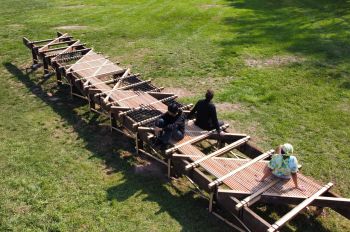Using Math as the Conduit to a Passion for Research

Stanley Nicholson (MATH ’23) says that he was always fascinated with biology. So, it may seem unusual that when he walks across the Commencement stage on May 13 at McCormick Place, he will be picking up a degree in applied mathematics from Illinois Institute of Technology.
However, Nicholson says that he has discovered that mathematics is an important key to unlocking biology’s closely held secrets.
“Biology is the perfect engineer,” Nicholson says. “All life is made up of trillions of cells, each with millions of proteins to build a beautifully intricate system. Math and physics offer insight into some of the problems that enable us to treat diseases. I think understanding biology and making medical advances using the tools of mathematics is my drive.”
Nicholson will work to fulfill that drive when he pursues a Ph.D. in applied mathematics at Brown University this fall. His effort will be supported by the National Science Foundation’s Graduate Research Fellowship Program.
His acceptance to graduate school was enhanced by the research experience that he gained while attending Illinois Tech. He participated in multiple research projects as an undergraduate student.
“The faculty are all very personable and will often let you do research with them regardless of your background, as long as you’re interested,” Nicholson says. “One of the big reasons I came to Illinois Tech was that professors often responded to emails in one day, something that’s rare in big public universities.”
His most recent research experience was working with David Minh, the Robert E. Frey Jr. Endowed Chair in Chemistry, and Robert Eisenberg, adjunct research professor of applied mathematics. The team applied an engineering computing tool to gain insights into protein structures through long simulations. These simulations can provide valuable information that can lead to the development of new drugs.
“My role was to implement the estimation tool, and then perform large-scale computation and simulation of the protein,” Nicholson says. “It was a lot of implementation, interpretation, and formulation of the next steps for the research vision. There’s some interesting math behind the use of the tool.”
Nicholson says that mathematics was vitally important to interpret the results. Having a mathematical background is needed to produce models and the future direction of the research project.
The research was Nicholson’s introduction to molecular dynamics, a field that had interested him. He gained an understanding of the chemical and biological system by seeing how the bonds are formed and the evolution of shifting protein parts.
“I really enjoyed the whole interdisciplinary aspect of the project,” he says. “We’re taking a tool from electrical engineering, applying it to a biological and chemical intuition, and using mathematics to develop a rigorous approach to the problem.”
Nicholson says he learned about how a research project progresses after each step. By working with faculty, he learned how to formulate the next move after processing results, examining the data used and evaluating what data to use next, and how results can be assessed and debated.
He says he also learned about the challenges that can arise while conducting research, and how to overcome them.
“The algorithm outputs a complicated network that models the protein, but has innumerable interpretations. So how do we identify low-dimensional substructures while staying biologically relevant?” Nicholson asks. “Obviously, we’re losing information, but how do we validate the results as to what the math and the physics are telling us.”
“We’re walking in the dark, so how do we shed light on it?” he continues. “That’s what’s fun about research.”
Nicholson was confident that Illinois Tech would prepare him to conduct research, but he had no idea that the resources at the university also would provide him the tools he needs to initiate a startup business. With the guidance of faculty at the Ed Kaplan Family Institute for Innovation and Tech Entrepreneurship, he was able to start Receptify with his peers.
Receptify was a tech tool that aimed to support survivors of sexual violence on college campuses throughout their recovery journeys. The research project included interviews with more than 100 clinicians, Title IX officers, and advocacy groups. Nicholson says he and his peers learned valuable lessons in launching a business through the Kaplan Institute’s Startup Accelerator.
“I didn’t know anything about the startup world before I got to Illinois Tech,” Nicholson says. “But now I see a lot of opportunities to do good in the biotech space through startups.”
He says the Startup Accelerator showed him the step-by-step process of developing a business, from an idea to customer interviews to building a minimal value product. The team also received advice in financing, prototyping, and the communications soft skills that are critical to a successful startup.
“I knew people started businesses, but it was all opaque to me,” Nicholson says. “I’m confident that I could initiate a startup knowing what I know now. If this whole academia path doesn’t work out for me, I can see myself going into the startup field.”
As he ends his journey at Illinois Tech, Nicholson says he has come to appreciate all of the opportunities at the university, and how taking advantage of them has prepared him to go on to pursue his Ph.D. at Brown and to continue his exploration of biology through mathematics.
“Being able to conduct research here and show that on my Ph.D. applications definitely helped me,” he says. “The opportunities are literally just sitting there, and 99 percent of the students here can benefit from them.”




